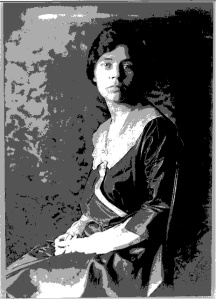 The Journal of Women’s History (Summer 2012 edition) has a fascinating article about suffragist leader Alice Paul that at times overwhelms in its detail as author Susan Ware discusses “The Book I Couldn’t Write: Alice Paul and the Challenge of Feminist Biography.”
The Journal of Women’s History (Summer 2012 edition) has a fascinating article about suffragist leader Alice Paul that at times overwhelms in its detail as author Susan Ware discusses “The Book I Couldn’t Write: Alice Paul and the Challenge of Feminist Biography.”
Historian Ware set out on a year-long’s journey to write Paul’s biography and threw in the towel after she couldn’t access the necessary personal detail that is the juice of biography. Paul left “no trail of breadcrumbs” as to her interior and personal life, according to Ware. In short, there was a great deal of “doing” in the trail Paul left behind, but little of the “being.”
One suspects that Paul’s training as an attorney and her leadership responsibilities made her hesitant about sharing the details of decision making as a cautionary device, even among close working partners. Paul was opinionated and not shy about directing the traffic of the movement, and very circumspect about revealing the strategic decision making, planning, and feelings she surely had about being on the razor’s edge of a historically pivotal movement.
Although Alice Paul brought a U.S President to his knees, little of what she left behind explains her thought process or describes the many sleepless nights she must have had working out strategic and tactical moves. When Paul was alive and the ERA issue in full swing, no biographer emerged to spend the time with Paul to elicit this sort of overview and detail other than Amelia Fry whose interviews with Paul can be accessed on the internet as oral history.
Yet as Ware notes, there is still a high level of interest in Alice Paul and what made her tick, especially among young women today. If someone were to crack the code, Ware suggests, many people would line up to listen.
Ware asks: “Who are the Alice Pauls of today? Third wave feminists of the Manifesta ilk such as Jennifer Baumgardner and Amy Richards identify ‘contemporary Alice Pauls’ as ‘young women who felt ignored by the women’s organizations founded by another generation’ and set out to make their own. In their formulation, contemporary Alice Pauls are feminists who think outside the box, challenge established authority, and are brave in the courage of their convictions. This parallels the portrait of Alice Paul that the screenwriters of Iron-Jawed Angels presented to viewers of their 2004 docudrama. That Paul’s courageous and unyielding militance moves and inspires new generations is amply confirmed by students’ impassioned responses to the film, despite its historical liberties—or perhaps because of them.”